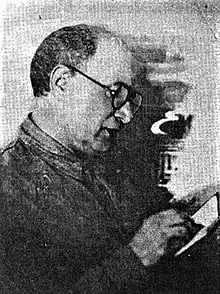
Bublichki (Russian: бублички, "hot buns" or "bagels"; sometimes transliterated as Bublitchki) is a Russian-language song from the New Economic Policy (NEP) era of the Soviet Union, written by Yakov Yadov. Тhe song's depiction of the harsh reality of life under the NEP resulted in it being banned until the late 1980s. Despite state repression, the song remained popular underground.
Background
Bublichki was written in the context of the New Economic Policy, an early Soviet economic plan designed to boost the country's collapsed economy. The NEP's mixed economy featured private enterprise, in contrast to the previous war communism.[1][2] While the NEP led to a resurgence in industrial and agricultural production, a large portion of the gains went to the wealthy NEPmen, leaving much of the general populace poor.[3] The singer in Bublichki is one of those left behind by the NEP, forced to resort to selling food on the street in order to survive.
While there have been multiple claims to authorship, most scholars agree that the song was written by Yakov Yadov.[4][5][6] Yadov was inspired to write the lyrics after a conversation with his friend, the performer Grigory Markovich Krasavin.[7] Krasavin had seen many signs asking for people to buy bagels, and, playing a familiar violin melody, asked Yadov to write lyrics to go along with the tune.[8] According to scholar Patricia Herlihy, the resulting blatnaya pesnya was one of the most popular songs of the NEP era.[6] The song's subversive themes resulted in the government banning it until the late 1980s; despite the ban, it remained popular by being passed down through word of mouth, though this resulted in many different versions of the song.[9]
The song proved persistently popular in translation among Yiddish-speaking Jews, though the translation lost the political nature of the original.[10] The American duo the Barry Sisters performed that Yiddish version as late as after World War II.[4] Bandleaders including Benny Goodman recorded English-language versions with the subtitle "The Pretzel Seller's Song."[11][12] Bublichki was also reworked into a jazz song by Soviet singer and bandleader Leonid Utyosov, who performed it with his orchestra.[13] Utyosov often performed songs from the blatnaya pesnya genre, including Bublichki and other songs by Yadov.[14]
Lyrics
As with many underground songs from the era, multiple versions of the lyrics exist.[2][15]
| Russian | English translation |
|---|---|
|
|
References
- ↑ Schwarz, Boris (1983). Music and Musical Life in Soviet Russia: Enlarged Edition, 1917-1981. Indiana University Press. p. 41. ISBN 0-253-33956-1.
- 1 2 Бахтин, Владимир (2001). "ЗАБЫТЫЙ И НЕЗАБЫТЫЙ ЯКОВ ЯДОВ". Нева (in Russian). Saint Petersburg, Russia. 2001 (2). Retrieved 31 January 2022.
- ↑ Rothstein, Robert A. (September 1980). "The Quiet Rehabilitation of the Brick Factory: Early Soviet Popular Music and its Critics". Slavic Review. 39 (3): 373–388. doi:10.2307/2497160. JSTOR 2497160. S2CID 164187954. Retrieved 15 February 2022.
- 1 2 Фетисова, Т. А. (2011). "АА Сидоров. Песнь о моей Мурке: история великих блатных и уличных песен". Вестник культурологии (in Russian) (3): 169–170.
- ↑ "Eg17". Institute of Judaica (in Russian). Archived from the original on 2012-01-15. Retrieved 31 January 2022.
- 1 2 Herlihy, Patricia (2018). Odessa Recollected: The Port and the People. Academic Studies Press. p. 46. ISBN 978-1-61811-737-3.
- ↑ Кравчинский, Максим (2012). История Русского Шансона (in Russian). Moscow, Russia: Астрель. pp. 182–186. ISBN 978-5-271-40036-0.
- ↑ Галяс, Александр (2006-06-30). ""БУБЛИКИ" НА ЛАНЖЕРОНОВСКОЙ". Порто-Франко (in Russian). No. 25. Retrieved 1 February 2022.
- ↑ James von Geldern; Richard Stites (1995-12-22). Mass Culture in Soviet Russia: Tales, Poems, Songs, Movies, and Folklore, 1916-1953. Indiana University Press. pp. 70–71. ISBN 978-0-253-32893-9.
- ↑ Balinska, Maria (2008). "Bagel Polemics in an Independent Poland". The Bagel: The Surprising History of a Modest Bread. Yale University Press. pp. 90–91. ISBN 978-0-300-11229-0. JSTOR j.ctt1nq6ph.10.
- ↑ "Who'll Buy My Bublitchki? (The Pretzel Vendor Song) (Pregon de las Cervecinas)". Internet Archive. Retrieved 17 February 2022.
- ↑ "WHO'LL BUT MY BUBLITCHKI? (The Pretzel Vendor Song)". Internet Archive. 15 March 1938. Retrieved 17 February 2022.
- ↑ Khiterer, Victoria (2017). "Seekers of happiness : Jews and jazz in the Soviet Union". Kultura Popularna. 51 (1): 36. doi:10.5604/01.3001.0010.4074. Archived from the original on 16 February 2022. Retrieved 16 February 2022.
- ↑ Hufen, Uli (October 2011). "Review of 'Das Regime und die Dandys. Russische Gaunerchansons von Lenin bis Putin'". The Slavonic and East European Review. 89 (4): 732. doi:10.5699/slaveasteurorev2.89.4.0731. JSTOR 10.5699/slaveasteurorev2.89.4.0731. Retrieved 16 February 2022.
- ↑ Гулак, Анастасия Анатольевна (21 February 2020). "Проекция массовой песни времен Великой Отечественной войны в материалах экспедиции М. Гринблата 1945 г." Часопіс Беларускага дзяр жаў нага ўніверсітэта. Філалогія. (in Belarusian) (1): 71. ISSN 2521-6775. Retrieved 16 February 2022.